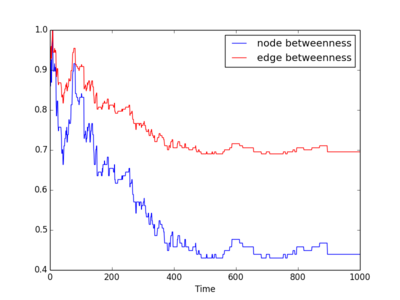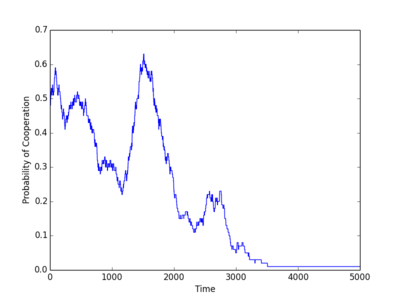Multiplex Networks: Difference between revisions
From Santa Fe Institute Events Wiki
No edit summary |
|||
| (33 intermediate revisions by 6 users not shown) | |||
| Line 1: | Line 1: | ||
'''Outcomes of first meeting''' | |||
Next Meeting: | (1) We develop several cases where multiplex networks can help illuminate dynamics that cannot be studied using a single network | ||
(a) Tax game, we need to talk more about payoffs and strategies. | |||
(b) Why Stalin went after friends and family of potential enemies? He recognized that informal networks matter | |||
(c) Dynamics of decision making and conflict resolution in firms and other organizations | |||
(d) We need some cases from ecology? | |||
(2) We divided into two groups: Modeling and Content | |||
The content group has to come up with ideas on what to model, in particular what is meaningful for each domain and what is meaningful across domain. They need to do some literature review, perhaps even find data that related to Multiplex networks. Who is coordinating this group? | |||
The modeling groups needs to talk some code from C++ to Python, perhaps make agents thicker,i.e. given them ability to do something. They also need to figure out a GUI that can be used by people who do not want to go into the code to change things. Ali is coordinating this group. | |||
(3) The sub-groups may meet more often, the large group will meet next on Wednesday | |||
'''Next Meeting: Wedn,18th time 1:30 PM, same place as last meeting''' | |||
Agenda for Meeting | Agenda for Meeting | ||
(1) | (1) CONTENT group: what does mean multiplex in your domain? | ||
a. What does multiplex network mean in different disciplines? | a. What does multiplex network mean in different disciplines? | ||
b. What are meaningful games in different disciplines? | b. What are meaningful games in different disciplines? | ||
| Line 11: | Line 29: | ||
(3) | (2) MODELLING group: modelling thinking. | ||
'''Next Meeting: Sun, 22th time 10-12 AM, same place as last meeting''' | |||
Agenda for Meeting | |||
(1) CONTENT group: | |||
Bucket: | |||
- the game; | |||
- the update rule; | |||
- the network topology. | |||
These 3 things have to be interpreted and justified. | |||
'''Next Meeting: Mon, 23rd time 4:15 PM, same place as last meeting''' | |||
(2) MODELLING group: second draft of general model | |||
==GROUPs== | |||
CONTENT: | |||
Brais, | |||
Cecilia, | |||
Francesca, | |||
Sanja. | |||
MODELLING: | |||
Alireza, | |||
Alberto, | |||
Cecilia, | |||
Francesca, | |||
Massimo, | |||
Vipin. | |||
*For those missing the Sunday meeting, please allocate yourself in one of the two groups. | |||
==QUESTIONS== | |||
SOCIAL ASPECT | |||
Model | |||
Bucket: | |||
- the game; | |||
- the update rule; | |||
- the network topology. | |||
These 3 things have to be interpreted and justified. | |||
What is the multiplex context? | |||
Which kind of games should be played? | |||
Coordination, Pure Coordination, Mixing Different Kinds | |||
Which kind of topologies should be coupled? | |||
Lattice, Erdos-Renyi, Scale-Free Networks | |||
What are the possible update rules that have sense? | |||
Which statistics should we register and measure? | |||
1 – The total amount of payoff in each layer over time | |||
2 – The total number of one convention players (i.e. how many tax payers are on a given layer)? | |||
Social Model Suggestions: | |||
Institutions and Tax Payers: Two different coordination games for formal/informal institutions with different coordination games; | |||
Social Revolutions: Two different topologies, one with a star graph like (with hierarchical structure, betweenness centrality) and one with a social network (...). | |||
ECOLOGICAL ASPECT | |||
Model a SIR model on the multiplex for predator-prey/vector relationships into an ecosystem. | |||
Generalise the data by using a random block model. | |||
How to apply game theory tools in ecological network? | |||
What is happening inside each node and in each link? | |||
==Data set== | |||
http://esapubs.org/archive/ecol/E092/066/default.htm | |||
http://ecologicaldata.org/find-data | |||
==Multiplex Networks in Ecology== | ==Multiplex Networks in Ecology== | ||
| Line 31: | Line 124: | ||
[http://tuvalu.santafe.edu/events/workshops/index.php/File:Allesina_and_Tang_2012.pdf Allesina and Tang 2012]<br> | [http://tuvalu.santafe.edu/events/workshops/index.php/File:Allesina_and_Tang_2012.pdf Allesina and Tang 2012]<br> | ||
[http://tuvalu.santafe.edu/events/workshops/index.php/File:Sauve_et_al._2013.pdf Sauve et al. 2013]<br> | [http://tuvalu.santafe.edu/events/workshops/index.php/File:Sauve_et_al._2013.pdf Sauve et al. 2013]<br> | ||
Formal and informal institutions | |||
http://www.jstor.org/stable/116898 | |||
==Multiplex Networks for Game Theory== | |||
References: | |||
Evolution of Cooperation in Multiplex Networks <br> | |||
http://www.ncbi.nlm.nih.gov/pmc/articles/PMC3431544/ | |||
Spontaneous Symmetry Breaking in Interdependent Networked Game | |||
http://www.nature.com/srep/2014/140214/srep04095/full/srep04095.html | |||
Ecological Networks | |||
[[File:Pocock_etal_2012_Network_of_Ecological_Networks_Robustness_&_Restoration.pdf]] <br> | |||
==Misc. References== | |||
[[http://deim.urv.cat/~manlio.dedomenico/multiplex.php | Manlio De Domenico]] | |||
=Software= | |||
== Design == | |||
[[ Multiplex Network Pseudocode ]] | |||
== Features == | |||
'''Existing Features''' <br> | |||
(1) Generic Network structure: complex node objects and complex edges <br> | |||
(2) node and edge attributes may change over time according to some rule<br> | |||
(3) asynchronous update for edge and node attributes <br> | |||
(4) Fermi update rule for playing pairwise games on each layer of network and changing strategies. <br> | |||
'''To be added'''<br> | |||
(1) synchronous update<br> | |||
(2) other update rules<br> | |||
(3) various specific networks structures <br> | |||
== Results == | |||
'''Changes in the average node betweenness and edge betweenness centrality measures'''<br> | |||
This example shows the we can measure structural properties of the network as it undergoes perturbations. <br> | |||
[[File:betweennessPerturbation.png|400px]] | |||
'''Changes in the number of cooperators as the nodes play games'''<br> | |||
This example shows the we can calculate a measure of dynamics of the process running of the network.<br> | |||
[[File:pdf1.png|400px]] | |||
'''Quick look at a hierarchy of factors for defecting from Non Democratic leadership'''<br> | |||
Request to summarise Brais's paper on drivers of defect. The model assumes a score would be applied to each element to develop a aggregate score of defect. | |||
[[File:Activism_heirarchy.pdf]] | |||
<br> | |||
Latest revision as of 23:02, 24 June 2014
Outcomes of first meeting
(1) We develop several cases where multiplex networks can help illuminate dynamics that cannot be studied using a single network
(a) Tax game, we need to talk more about payoffs and strategies.
(b) Why Stalin went after friends and family of potential enemies? He recognized that informal networks matter
(c) Dynamics of decision making and conflict resolution in firms and other organizations
(d) We need some cases from ecology?
(2) We divided into two groups: Modeling and Content The content group has to come up with ideas on what to model, in particular what is meaningful for each domain and what is meaningful across domain. They need to do some literature review, perhaps even find data that related to Multiplex networks. Who is coordinating this group?
The modeling groups needs to talk some code from C++ to Python, perhaps make agents thicker,i.e. given them ability to do something. They also need to figure out a GUI that can be used by people who do not want to go into the code to change things. Ali is coordinating this group.
(3) The sub-groups may meet more often, the large group will meet next on Wednesday
Next Meeting: Wedn,18th time 1:30 PM, same place as last meeting
Agenda for Meeting
(1) CONTENT group: what does mean multiplex in your domain? a. What does multiplex network mean in different disciplines? b. What are meaningful games in different disciplines? c. What are meaningful strategies in different disciplines?
(2) MODELLING group: modelling thinking.
Next Meeting: Sun, 22th time 10-12 AM, same place as last meeting
Agenda for Meeting
(1) CONTENT group: Bucket: - the game; - the update rule; - the network topology. These 3 things have to be interpreted and justified.
Next Meeting: Mon, 23rd time 4:15 PM, same place as last meeting
(2) MODELLING group: second draft of general model
GROUPs
CONTENT: Brais, Cecilia, Francesca, Sanja.
MODELLING: Alireza, Alberto, Cecilia, Francesca, Massimo, Vipin.
- For those missing the Sunday meeting, please allocate yourself in one of the two groups.
QUESTIONS
SOCIAL ASPECT
Model
Bucket: - the game; - the update rule; - the network topology. These 3 things have to be interpreted and justified.
What is the multiplex context? Which kind of games should be played? Coordination, Pure Coordination, Mixing Different Kinds Which kind of topologies should be coupled? Lattice, Erdos-Renyi, Scale-Free Networks What are the possible update rules that have sense?
Which statistics should we register and measure? 1 – The total amount of payoff in each layer over time 2 – The total number of one convention players (i.e. how many tax payers are on a given layer)?
Social Model Suggestions: Institutions and Tax Payers: Two different coordination games for formal/informal institutions with different coordination games; Social Revolutions: Two different topologies, one with a star graph like (with hierarchical structure, betweenness centrality) and one with a social network (...).
ECOLOGICAL ASPECT
Model a SIR model on the multiplex for predator-prey/vector relationships into an ecosystem.
Generalise the data by using a random block model.
How to apply game theory tools in ecological network?
What is happening inside each node and in each link?
Data set
http://esapubs.org/archive/ecol/E092/066/default.htm
http://ecologicaldata.org/find-data
Multiplex Networks in Ecology
References:
A colonization-extinction 'game' on an ecological multiplex network (trophic & dispersal interactions):
Pillai et al. 2011
How including different interaction types changes ecological dynamics:
Allesina and Tang 2012
Sauve et al. 2013
Formal and informal institutions http://www.jstor.org/stable/116898
Multiplex Networks for Game Theory
References:
Evolution of Cooperation in Multiplex Networks
http://www.ncbi.nlm.nih.gov/pmc/articles/PMC3431544/
Spontaneous Symmetry Breaking in Interdependent Networked Game http://www.nature.com/srep/2014/140214/srep04095/full/srep04095.html
Ecological Networks
File:Pocock etal 2012 Network of Ecological Networks Robustness & Restoration.pdf
Misc. References
Software
Design
Features
Existing Features
(1) Generic Network structure: complex node objects and complex edges
(2) node and edge attributes may change over time according to some rule
(3) asynchronous update for edge and node attributes
(4) Fermi update rule for playing pairwise games on each layer of network and changing strategies.
To be added
(1) synchronous update
(2) other update rules
(3) various specific networks structures
Results
Changes in the average node betweenness and edge betweenness centrality measures
This example shows the we can measure structural properties of the network as it undergoes perturbations.

Changes in the number of cooperators as the nodes play games
This example shows the we can calculate a measure of dynamics of the process running of the network.

Quick look at a hierarchy of factors for defecting from Non Democratic leadership
Request to summarise Brais's paper on drivers of defect. The model assumes a score would be applied to each element to develop a aggregate score of defect.
